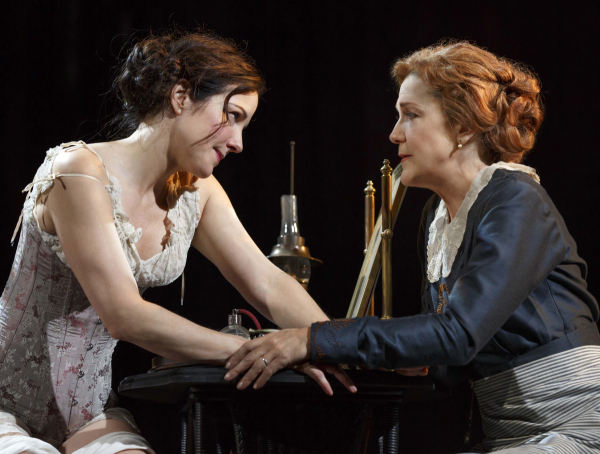The Snow Geese

(© Joan Marcus)
What happens when you combine the yearning period dramas of Anton Chekhov with dynamics of the popular Showtime series Weeds? You get Sharr White’s The Snow Geese, an ungainly new play currently premiering under Daniel Sullivan’s unfocused direction at Manhattan Theatre Club’s Samuel J. Friedman Theatre. It’s a shame all around, since White is a promising playwright, Sullivan is a tremendous director, and Mary-Louise Parker, Danny Burstein, and Victoria Clark are among the enviable cast.
Comparisons to Weeds, the dark television comedy in which Parker starred for eight seasons, are unavoidable. On that show, she played a suburban widow who takes to dealing drugs to support her two growing sons. In The Snow Geese, Parker trades in the skinny jeans and Mary Jane to play a World War I-era suburban widow with two (grown) sons (minus the drugs, if you don’t count laudanum for her grief). The year is 1917, the war is raging, and Elizabeth Gaesling (Parker) is mourning the recent death of her husband, Teddy (Christopher Innvar). The family has gathered at their country home to celebrate the start of hunting season before eldest, privileged son, Duncan (Evan Jonigkeit), heads off to war. But something’s amiss in the Gaesling residence: Younger son, Arnold (Brian Cross), who’s spent his life living in Duncan’s shadow, has discovered the family has no money, a revelation that throws the household into chaos and puts the brothers at odds.
Cross is most impressive in his Broadway debut, nearly stealing the show from his more experienced costars with expertly timed explosions of rage that you can see simmering under his skin throughout the play. Jonigkeit is a solid foil, strutting around the stage with a nicely annoying cockiness that devolves with the realization that part of his life has been a lie. Burstein and Clark are immaculately understated (and incredibly underutilized) as Max and Clarissa Hohmann, Elizabeth’s brother-in-law and sister. Jessica Love offers a touching portrayal as Viktorya, the family’s new cook and maid.
Audiences expecting one of Parker’s typically laser-sharp and incisive performances will likely be disappointed, but it’s not really her fault. Much the way MTC’s recent off-Broadway premiere of Liz Flahive’s The Madrid didn’t focus on Edie Falco’s character (despite her likeness used in all of the marketing materials), The Snow Geese isn’t really about Elizabeth. The text haphazardly veers back and forth between her grief and the conflict between the siblings; it’s as if White and Sullivan can’t make up their minds as to what the focus should be. Parker, unfortunately, is stuck in the gray area of this indecision — Elizabeth is too often on the periphery of the action, and when she finally does have her moments in the spotlight, it disrupts the flow of the (more interesting) storyline. At least she looks stunning in costumer Jane Greenwood’s beautifully designed widow’s clothes.
In fact, it’s in the design where the production entirely succeeds. John Lee Beatty has outdone himself in creating an automated jigsaw puzzle of a set that brings to jaw-dropping life the wooden interior of the Gaesling family lodge and the foggy hunting swamp outside its doors. This is perfectly complemented by Greenwood’s period-specific costumes and Japhy Weideman’s shadowy lighting. Now if only the inhabitants of The Snow Geese were as ready for prime time as the world in which they’re supposed to live.










